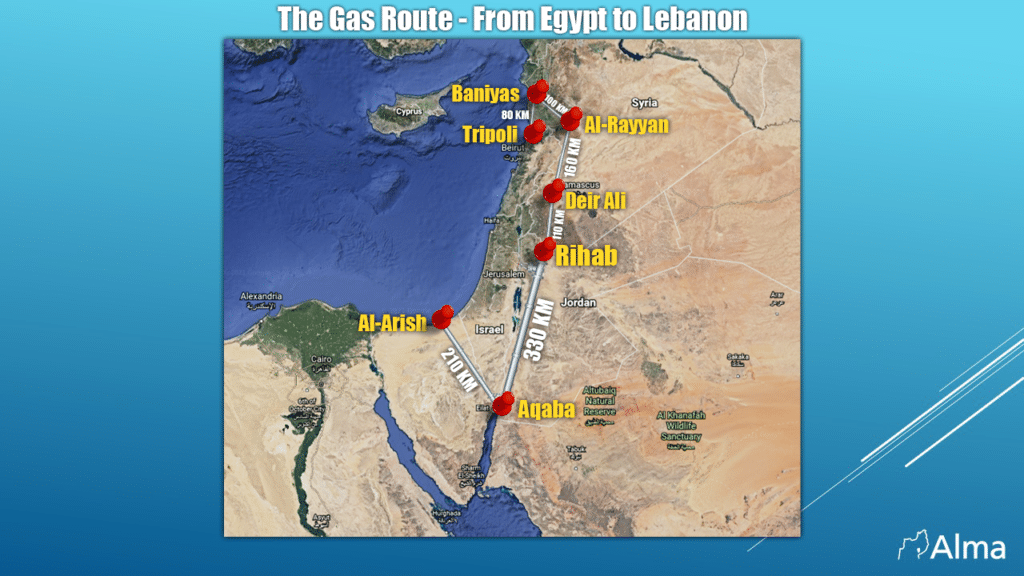In recent months, regional Arab states and the U.S. have been hammering out the details of a plan designed to rescue Lebanon from its severe energy crisis.
The idea involves the transfer of Egyptian natural gas to Lebanon via pipelines that run from the Sinai Peninsula, into Jordan, and through Syria to feed Lebanon’s Deir Ammar power plant, which has a 450-megawatt capacity.
In addition, according to the plan, Jordan is supposed to link its electrical grid to Lebanon’s grid via Syria to increase supply.
According to Jordanian Energy Minister Hala Adel Al-Zawati, Jordan could export 250 megawatts of electricity to Lebanon in this manner.
The initiative has been picking up steam in recent weeks and enjoys the backing of the American Biden administration. It appears to be heading gradually towards implementation.
It carries with it both potentially positive and negative effects from the standpoint of regional security.
On the one hand, positioning Egypt, a central moderate Sunni pragmatic power, as a new energy supplier to Lebanon could help sideline Iranian-Hezbollah efforts to exploit the energy crisis to increase further the domination of the Tehran radical axis in fractured Lebanon.
Iran has in recent weeks begun shipping oil to Syria’s Baniyas Port, with Hezbollah then trucking it into Lebanon in response to the energy crisis. Should such oil shipments increase, the move would further strengthen the radical Shi’ite axis’s monopoly on precious national Lebanese resources and resulting political power. It would also boost Hezbollah’s domestic marketing campaign, in which it presents itself as the ‘savior’ of Lebanon.
On the other hand, the role that the Syrian Assad regime would play in this plan would inevitably assist its efforts to regain international legitimacy if the plan is approved. The idea of granting Assad sanctions relief appears contrary to the interests of regional security. It raises concerns that Hezbollah could exploit the lifting of restrictions as well for its benefit.
At this time, it remains unclear whether Hezbollah could exploit the gas plan to its benefit. In any case, the international community has made no effort whatsoever to address Hezbollah’s large-scale force build-up across Lebanon or address the use of fuel imports into Lebanon by Hezbollah to help finance and power its dangerous military build-up activities.
The Egyptian gas plan: A situation picture
Statements by the regional Arab minister appear to signal that the plan is gaining momentum and that the chances are high that it will enter the implementation stage. However, a precise timetable appears to be out of reach at this stage due to several hurdles that remain in place.
In September, Lebanese Oil Minister Tarek El Molla told Bloomberg that the gas would begin arriving in Lebanon by the end of 2021, adding that the Lebanese government had submitted a funding request for the World Bank to back the plan.
According to international media reports, in September, energy ministers from Lebanon, Syria, Jordan, and Egypt agreed to the plan during a meeting in Amman.
Bloomberg reported in September that Egypt’s natural gas is scheduled to be delivered to Lebanon through Jordan and Syria within three months, “as the Arab states seek to help end power shortages in their crisis-ridden neighbor.”
However, it cited El Molla as stating that the neighboring states will need the time to assess the infrastructure connecting them to Lebanon, which requested 60 million cubic feet a day of natural gas.
Syrian Electricity Minister Ghassan al-Zamel estimated that it would cost around 10 million dollars and two to four months of work to repair the country’s gas pipeline infrastructure before the plan could go ahead.
Meanwhile, after September’s Amman meeting, Syrian Oil Minister Bassam Tohme reportedly said that the pipeline running through Syria would require repair work due to damages sustained during the decade-long civil war and recent ISIS attacks.
“Each state will send technical teams to inspect the pipeline over the next few weeks,” the report said, citing the Syrian oil minister.
Backing from Washington has been overt, with U.S. Ambassador to Lebanon Dorothy Shea telling Al Arabiya that the U.S. is in talks with Egypt, Jordan, and the World Bank “to find sustainable solutions to Lebanon’s energy needs.”
The pipeline in question – the Arab Gas Pipeline – had in the past delivered Egyptian gas to Lebanon through Jordan and Syria, but this stopped after a series of attacks on it during the Syrian war and due to rising domestic Egyptian demand, which hampered its gas exports.
The scope of Lebanon’s dire energy situation received a reminder on October 9, when the country experienced a full-on blackout and its two power stations shut down over fuel shortages.
The Lebanese Armed Forces began providing emergency fuel supplies, offering a partial restoration of power, but fears of more blackouts persist.
The string of incidents continued when a large fire tore through Lebanon’s Al Zahrani oil facility, which took days to put out. The fire was extinguished on October 11. The facility is near Lebanon’s second power plant, also called Al Zahrani.
Both the Al Zahrani and Deir Ammar plants have been suffering from months of chronic shortages, with the Lebanon government unable to secure funds to import sufficient fuel. Many Lebanese citizens have resorted to private generator power, but these run on fuel, which is increasingly limited.
The Beirut government, dominated by the pro-Hezbollah March 8 alliance, is now pinning its hopes on the Egyptian gas deal.
The Syrian question: Will the U.S. circumvent its own sanctions?
According to official state Syrian media, Syrian Oil Minister Bassam Tohme confirmed that his country would receive fees for transferring the gas via its territory.
The most immediate question that stems from the plan is how the U.S. can support Syria’s transportation of gas to Lebanon when it remains under strict U.S. and E.U. sanctions, including oil and trade.
The May 2018 Caesar Act sanctions, passed by the Trump administration, and the E.U., ‘s sanctions, mean the Assad regime is forbidden from exporting energy supplies, including gas from Egypt and electricity from Jordan.
Bashar_al-Assad U.S. President Joe Biden. (Official White House Photo by Adam Schultz)
The Assad regime, for its part, recognized an opportunity to gain long-sought-after international legitimacy and a new income stream. It announced that it is ready to help Lebanon by transiting energy supplies across its territories.
For this plan to go ahead, Washington will have to violate the sanctions or pass new legislation that exempts energy transfer to Lebanon via Syria from existing sanctions.
This has sparked intense debate in Washington. According to some reports, the Biden administration is exploring the possibility of waiving sanctions on Assad to facilitate the deal.
The Washington Free Beacon said the administration wants to waive portions of the bipartisan Caesar Act, “which applied wide-ranging sanctions on Assad for his war crimes in Syria, to facilitate an energy deal with Arab nations that would provide the Assad regime with a financial and political lifeline.”
This has created pushback among Republican foreign policy figures, who have said the sanctions relief would embolden Assad, his Iranian backers, and his Hezbollah allies.
“Why in the world would the Biden administration lift sanctions on one of the most brutal human rights abusers in the world—the Assad regime?” Joe Wilson, a House Foreign Affairs Committee member and chair of the Republican Study Committee’s National Security and Foreign Affairs Task Force, was quoted as saying.
An additional Congressional source stated that “Assad is desperate for hard currency, and that’s what they are going to get from this via the transit fees. The regime is literally starved for cash, and Biden is saving them by the bell.”
On the other hand, Biden administration officials argue that the deal with harm the interests of Iran and Hezbollah since it would remove Iran as the country’s fuel supplier.
In August, U.S. Ambassador to Lebanon Dorothy Shea said that Lebanon would not need Iranian oil tankers to rescue it, telling Al Arabiya English, “I’m trying to find solutions for the Lebanese people. We’ve been talking to the governments of Egypt, Jordan, the government here [Lebanon], the World Bank. We’re trying to get real, sustainable solutions for Lebanon’s fuel and energy needs.”
Yet Hezbollah has apparently not yet given up on its plan to import Iranian oil.
Hashem Safieddine, the head of Hezbollah’s executive council, told Iranian state media, in reference to the Iranian oil tankers, “With one stroke we broke the siege on three countries: We purchased the fuel from Iran, we transferred it through Syria and besieged Lebanon benefited from it. This is a first step that we will follow with others.”
The Biden, therefore, believes that the alternative, non-Iranian fuel channel is the best response step going forward.
The Iranian – Hezbollah axis’s role
Some regional observers have sided with the Biden administration’s view. According to the Lebanon Debate website, the revival of the Arab Gas Pipeline will see gas flow through countryside Syrian towns around Damascus, passing through Homs, north of Damascus, and then west, to TelKalah in western Syria. From there, it would arrive at the Deir Ammar power station in northern Lebanon.
All of the Syrian border towns involved in the plan are under Hezbollah’s control or influence.
The Lebanon Debate website raised the prospect of a Jordanian-Syrian security initiative to protect the pipeline, which it claimed could weaken the influence of the Iranian – Hezbollah axis in the region.
A recent blast that tore through a section of the pipeline, an attack that ISIS took responsibility for, is in actuality a message from Iran that it cannot be left out of a major energy project involving Syria and Lebanon, the Lebanon Debate website claimed.
According to the report, the Jordanians understood the message and began coordinating with Iran regarding the project. Whether or not Iran is behind the blast, its dissatisfaction with the alternative energy route seems inevitable.
The Lebanon Debate report also explored how the gas might affect the increased Hezbollah presence in northern Lebanon, where Hezbollah has built a network of sleeper cells and armed operatives to further its influence there.
According to the report, Hezbollah is seeking to change northern Lebanon’s demographic balance in favor of Shi’ites and to the detriment of Sunnis, as has occurred in Syria, under the excuse of “the war on ISIS.” According to this reported plan, Lebanese Sunni residents would flee their homes in Hezbollah’s hope, particularly in Tripoli, a poor city prone to terrorism and criminal activity.
“The process of supplying energy to the north [of Lebanon] through the Arab Gas Pipeline could act like an Arab rescue rope to this area and its [Sunni] residents, and lead to development and [other] projects for residents and youths in this area,” the report said.
Israel’s perspective
Official Israel has remained silent on the Egyptian natural gas plan for Lebanon. This is likely due to Israel’s desire not to undermine American efforts to assist Lebanon and possibly a lack of a consensus position within the diplomatic and intelligence community over the issue.
However, veteran Israeli Middle East television analyst Ehud Ya’ari did raise the question of whether it would actually be Egyptian and not Israeli gas that reaches Lebanon.
Ya’ari said that it is convenient for Assad and Nasrallah to pretend “that it will indeed be Egyptian gas that will flow into Lebanon,” adding that according to the plan, the Arab Gas Pipeline would receive gas that flows to Jordan’s southern Aqaba city from a point located south of Egypt’s Taba town, in the Sinai Peninsula, via a pipeline on the floor of the Red Sea.
From there, the gas would supposedly flow to Jordan, Syria, and Lebanon. However, according to Ya’ari, the pipeline in north Sinai is currently filled with gas that Israel exports to Egypt, and it is flowing in the opposite of the intended plan’s direction – from west to east, into Egypt. As a result, Ya’ari said, in order to transfer gas from Sinai’s Al-Arish northern town south to the Red Sea, “there is no choice but to send gas that Egypt purchases from Leviathan [a gas field in Israel’s territorial Mediterranean waters].”
Ya’ari argued that Jordan’s King, Abdullah, views the plan as a step forward in a broader effort to remove Assad from Iran’s bear hug, while Egypt’s President, Fattah El-Sisi, “always opposed ejecting Assad” from the regional club.
Despite the above claims, there have been no reported objections from Israel to stop the plan at this stage.
This suggests that Jerusalem could itself be torn between the perceived benefit of sidelining Iran and the risk of easing sanctions on Assad, with the overall accumulative effect on Hezbollah unknown from this vantage point.
Additional consideration may lie in the assessment that allowing Lebanon to simply collapse could push Hezbollah to take provocative action against Israel to distract attention from domestic crises.
With so many unknowns yet to be resolved, the gas rescue plan seems to be going ahead, with much more at stake than natural gas supply.
Sources
Egyptian Gas to Reach Lebanon By Year-End, Says Minister, Bloomberg, September 14, 2021. https://www.bloomberg.com/news/articles/2021-09-14/egyptian-gas-to-reach-lebanon-by-year-end-says-minister
Ayman Abdel Nor Twitter account, September 8, 2021 https://twitter.com/aabnour/status/1435370520661282816?s=24
NabdApp Website, accessed October 13, 2021. http://nabdapp.com/t/93071868
Syrian Arab News Agency, accessed October 13, 2021. http://www.sana.sy/?p=1473907
Adam Kredo, Biden Admin Seeks to Waive Sanctions on Assad, The Washington Free Beacon, September 8, 2021. https://freebeacon.com/biden-administration/biden-admin-seeks-to-waive-sanctions-on-assad/amp/?__twitter_impression=true
Spotshotvideo, accessed October 13, 2021. https://www.spotshotvideo.com/news/522332
Ehud Ya’ari, Will Israeli Gas Reach Hezbollah? (Hebrew), N12, October 9, 2021. https://www.mako.co.il/news-world/2021_q4/Article-9c9dc0164456c71026.htm
Timeline Of When Lebanon Will Get Jordanian Electricity Now Depends On Syria, The961, September 10, 2021. https://www.the961.com/when-lebanon-receive-electricity-jordan/
Zvi Bar’el, Lebanon Won’t Care Its Energy Has Israeli Fingerprints on It, Haaretz, October 11, 2021. https://www.haaretz.com/israel-news/in-its-hour-of-need-lebanon-won-t-care-its-energy-has-israeli-fingerprints-on-it-1.10282678
Dave Mistich, Power returns to Lebanon after a 24-hour blackout, NPR, October 10, 2021. https://www.npr.org/2021/10/10/1044911779/power-lebanon-outages-economic-crisis-fuel-shortages
France 24, Syria agrees to transit gas and electricity to crisis-hit Lebanon, September 5, 2021. https://www.france24.com/en/middle-east/20210905-syria-agrees-to-transit-gas-and-electricity-to-crisis-hit-lebanon
Tzvi Joffre, Fire at Lebanon’s Zahrani oil facility contained, The Jerusalem Post, October 11, 2021. https://www.jpost.com/breaking-news/fire-breaks-out-at-lebanons-zahrani-oil-facility-681623
Adam Kredo, Biden Admin seeks to wave sanctions on Assad, The Washington Free Bacon, September 8, 2021. https://freebeacon.com/biden-administration/biden-admin-seeks-to-waive-sanctions-on-assad/amp/?__twitter_impression=true
Joseph Haboush, Al Arabiya English, U.S. talking to Egypt, Jordan to help Lebanon’s fuel, energy needs: Senior U.S. diplomat, August 19, 2021. https://english.alarabiya.net/amp/News/middle-east/2021/08/19/US-to-help-Lebanon-with-electricity-Lebanese-presidency









2 Responses